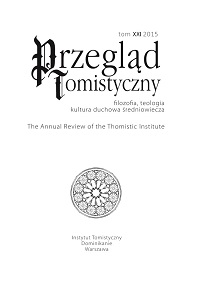Jak chrześcijanin powinien zareagować na sekularyzację?
How Should a Christian React to Secularization?
The Two Types of Reactions Represented by German Theologians
Author(s): Michał PaluchSubject(s): Christian Theology and Religion
Published by: Instytut Tomistyczny
Keywords: Secularization; modern era; R. Guardini; D. Bonhoeffer; Gaudium et spes; sekularyzacja; nowożytność
Summary/Abstract: Secularization is understood in this paper as the process of excluding subsequent areas of social and individual life from the influence of religion. The paper presents (I) the causes and dynamics of secularization, (II) the standpoints of the two chosen German theologians — Romano Guardini and Dietrich Bonhoeff er and (III) the standpoint of the Gaudium et spes. The main cause of secularization is the change of the worldview — the transition from theocentrism to anthropocentrism in the modern era. Yet there are multiple causes of this transition: the Copernican revolution, geographic discoveries, religious divisions and wars among Christians, industrial revolution, emancipation of reason, crisis of authority, the rejection of the final and formal causality, the use of the theory of evolution against Christianity. Th e process of secularization has concerned subsequent spheres of the social and individual life: power, science, economy and, recently, the family. The span of Christian reactions to secularization may be illustrated by the proposals of a Catholic priest, Romano Guardini, on the one hand, and of a Lutheran pastor, Dietrich Bonhoeffer, on the other. Guardini in his famous essay The end of the modern world criticizes the modern understanding of nature (cf. Goethe) and of person (cf. Kant). Both concepts have been cut off from the Christian background. But without the religious context, they must disappear. Christians are invited in such circumstances to bear witness to their faith. The modern world should experience all the consequences of wrong ideological decisions. Bonhoeffer in his Letters from prison formulates a deeply different proposal of reaction to the modern world. In his opinion Christians should adopt a non-religious attitude of confessing faith to discover a mature way of living Christianity in the modern era. His project of non-religious Christianity was undertaken by the next generation of theologians, both Lutheran and Catholic, who developed different forms of theology of secularization and of political theology. The Constitution Gaudium et spes of the Second Vatican Council does not use the word secularization but it proposes a reflection on the “new conditions” that have had their impact on religion. Th e main direction of the proposed reaction to the transformations of the modern era is closer to Guardini’s proposal. Nevertheless, there are some accents that take into account the sensibility articulated by Bonhoeffer and his followers (esp. no. 7: “a more critical ability to distinguish religion from a magical view of the world and from the superstitions which still circulate purifies it and exacts day by day a more personal and explicit adherence to faith”). Equally important, the Constitution gives a useful criterion for the evaluation of different elements of the social transformations. This criterion is the quality of human autonomy (no. 36). If this autonomy is treated and experienced as a gift of the Creator, it should be accepted. If it is understood as a rebellion against God, it is to be avoided by Christians. In this way, the text of the Gaudium et spes helps to show when and under what condition anthropocentrism may not diverge from theocentrism.
Journal: Przegląd Tomistyczny
- Issue Year: 2015
- Issue No: XXI
- Page Range: 469-489
- Page Count: 21
- Language: Polish

